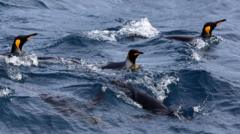The decision aims to eliminate loopholes that can be exploited for trade manipulation, sparking debate over its impact.
US Tariffs Target Remote Islands: A Surprising Move for Trade Policy

US Tariffs Target Remote Islands: A Surprising Move for Trade Policy
The US government's recent tariff imposition on uninhabited islands raises eyebrows and trade concerns.
The US Commerce Secretary has stood firmly behind the recent decision to impose tariffs on the Heard and McDonald Islands, a remote territory known for its population of penguins and seals. Howard Lutnick emphasized that this action is necessary to close what he referred to as “ridiculous loopholes” that could otherwise allow foreign entities to exploit these islands as a gateway for shipping goods into the United States. This assessment comes amidst a 5% decline in all three major US stock indexes last Friday, marking the most severe week for the US market since 2020.
The Australian government expressed astonishment at the announcement, with Trade Minister Don Farrell deeming the decision a “clear mistake” that originated from a hasty assessment process. In response to inquiries regarding the logical basis for the tariffs encompassing an area as peculiar as the Heard and McDonald Islands, Lutnick explained, "If you leave anything off the list, the countries that try to basically arbitrage America go through those countries to us." He assured the public that the President is dedicated to addressing these trade challenges.
Shipping products through specific ports, referred to as transshipment, is a common practice in international trade. However, entities like the Pew Charitable Trusts have alerted that this method can also lead to malpractices, allowing unscrupulous actors to manipulate shipping data. Their research indicates that hundreds of millions of dollars in fisheries products, such as tuna, are unlawfully transported via these channels each year in the western and central Pacific.
While data from the World Bank indicates that imports from the Heard and McDonald Islands to the US are typically limited, in 2022 the US accounted for approximately $1.4 million (A$2.23 million) of almost entirely unspecified “machinery and electrical” exports from this territory. Alongside the US tariffs affecting the islands, tariffs were also placed on the British Indian Ocean territory, where military presence is the only form of occupation, which reported around $414,350 in exports to the US last year. The meticulous balancing act of safeguarding trade integrity while navigating international relations remains at the forefront of this surprising policy decision.
The Australian government expressed astonishment at the announcement, with Trade Minister Don Farrell deeming the decision a “clear mistake” that originated from a hasty assessment process. In response to inquiries regarding the logical basis for the tariffs encompassing an area as peculiar as the Heard and McDonald Islands, Lutnick explained, "If you leave anything off the list, the countries that try to basically arbitrage America go through those countries to us." He assured the public that the President is dedicated to addressing these trade challenges.
Shipping products through specific ports, referred to as transshipment, is a common practice in international trade. However, entities like the Pew Charitable Trusts have alerted that this method can also lead to malpractices, allowing unscrupulous actors to manipulate shipping data. Their research indicates that hundreds of millions of dollars in fisheries products, such as tuna, are unlawfully transported via these channels each year in the western and central Pacific.
While data from the World Bank indicates that imports from the Heard and McDonald Islands to the US are typically limited, in 2022 the US accounted for approximately $1.4 million (A$2.23 million) of almost entirely unspecified “machinery and electrical” exports from this territory. Alongside the US tariffs affecting the islands, tariffs were also placed on the British Indian Ocean territory, where military presence is the only form of occupation, which reported around $414,350 in exports to the US last year. The meticulous balancing act of safeguarding trade integrity while navigating international relations remains at the forefront of this surprising policy decision.




















